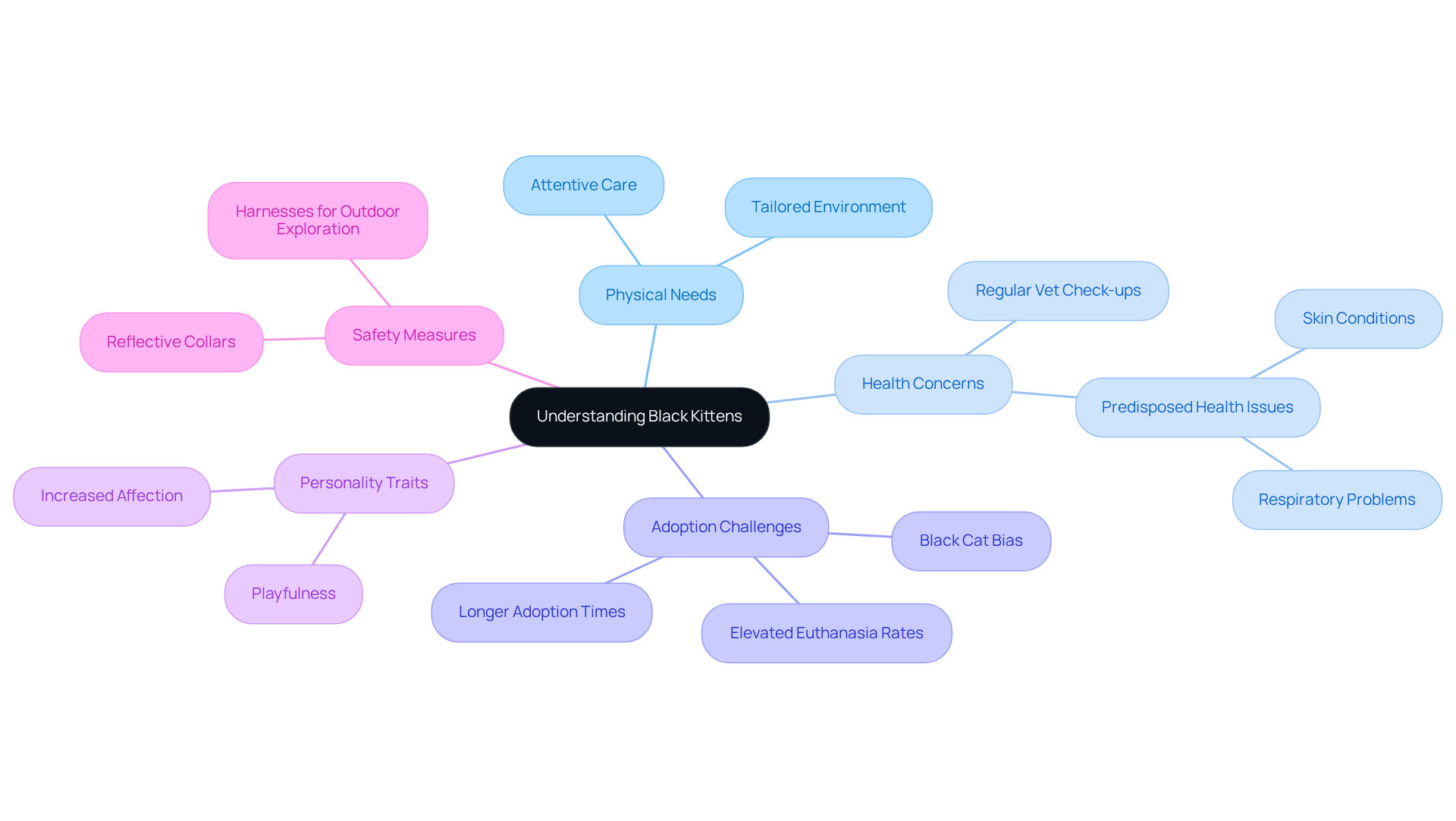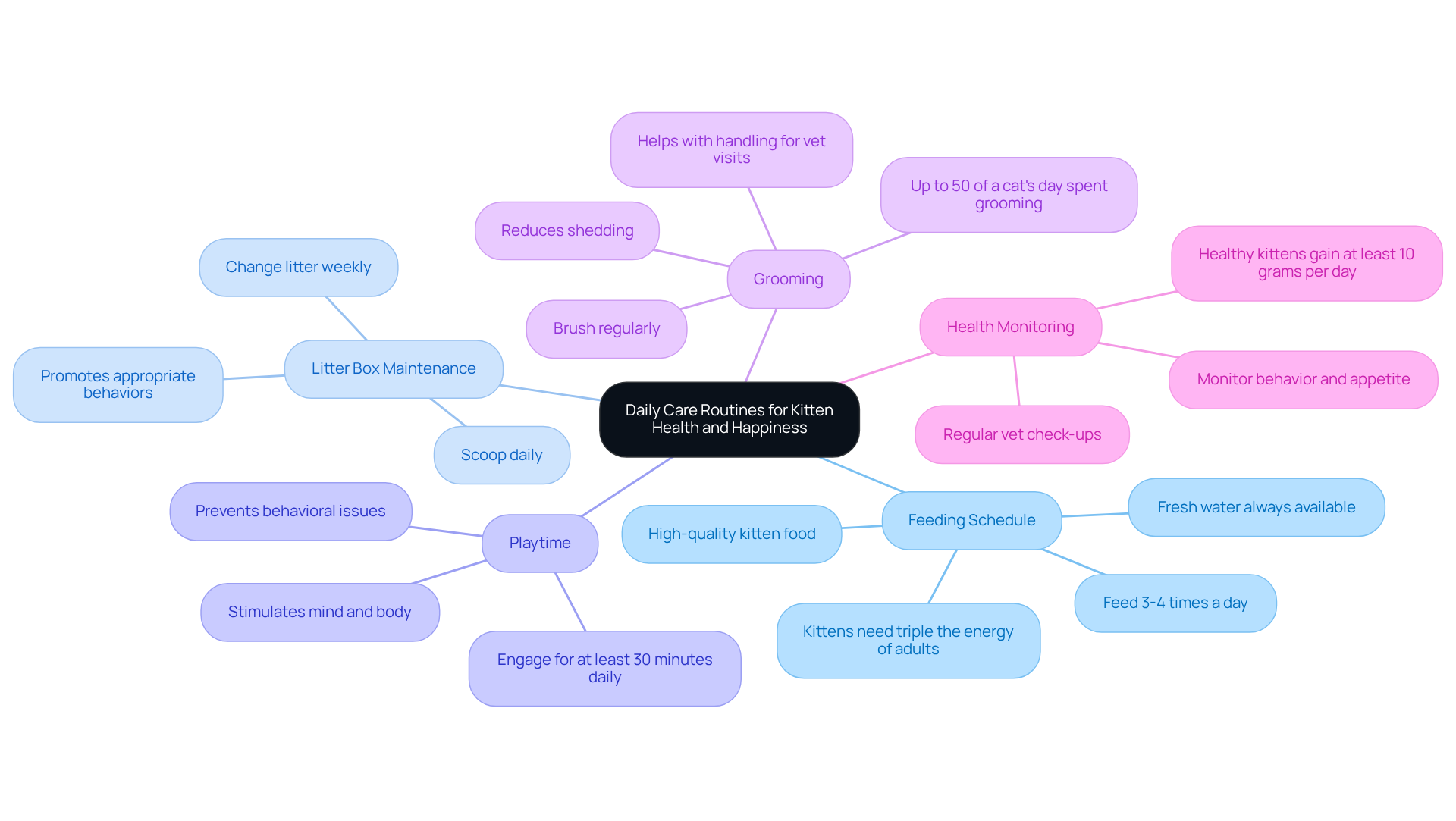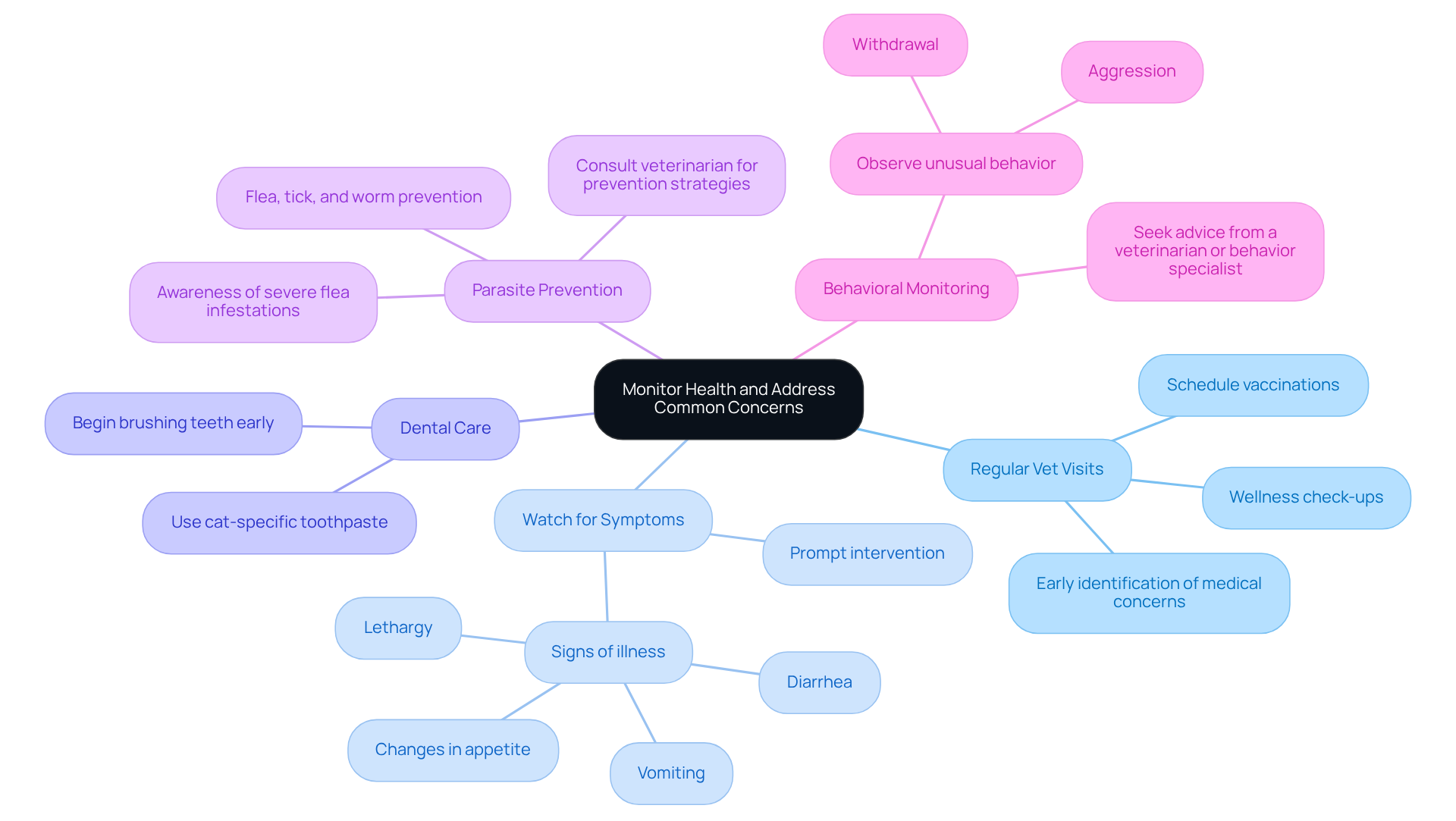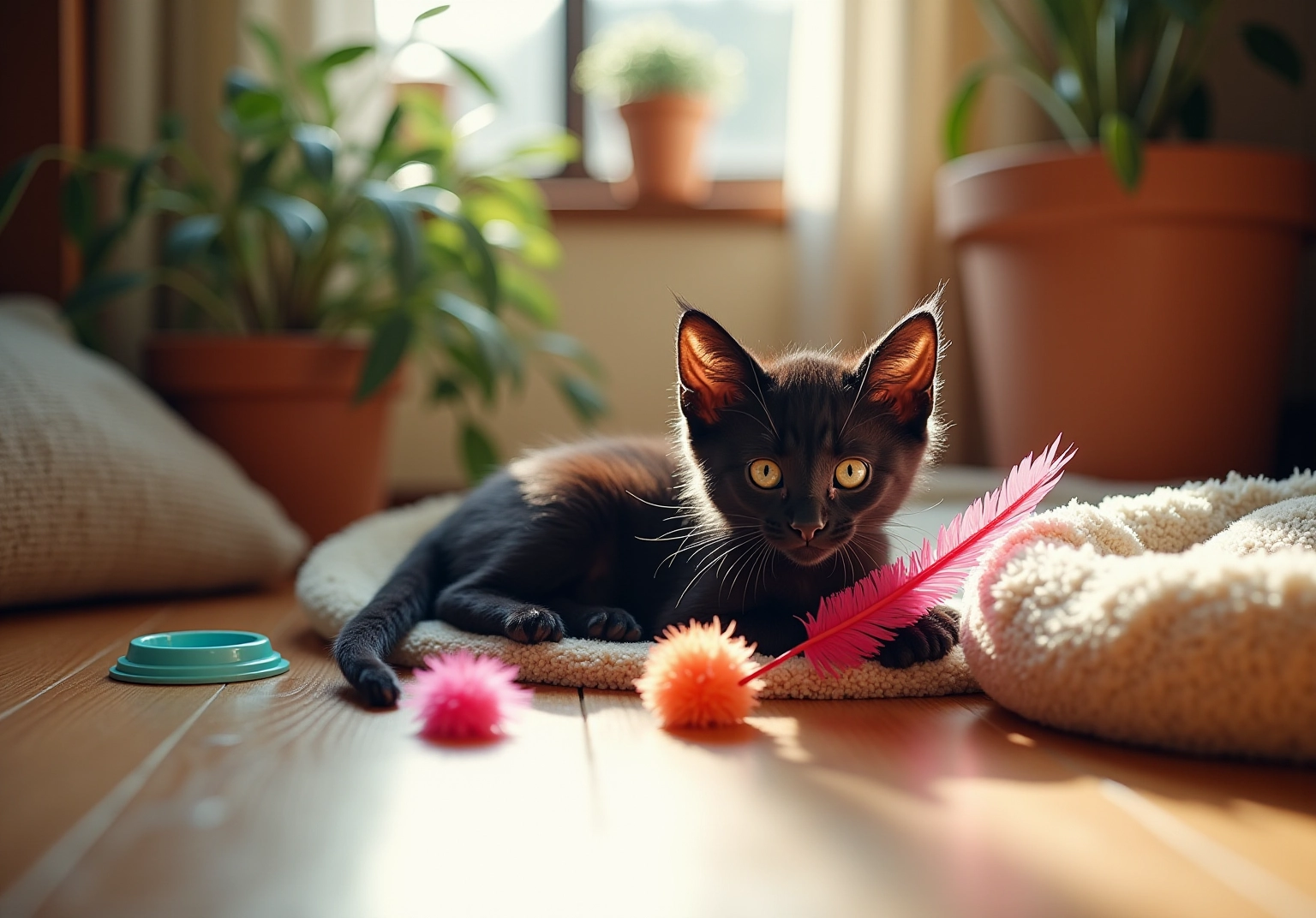5 Steps to Care for Your Black Kitten Effectively
Overview
Caring for a black kitten is a rewarding journey, and understanding their unique needs is the first step. Your furry family members deserve tailored care that addresses their specific requirements. Start by gathering the necessary supplies to create a nurturing environment that promotes their well-being and happiness.
Establishing a safe living space is crucial. Ensure that your home is secure, allowing your kitten to explore without fear. Daily care routines, including:
- Feeding
- Playtime
- Grooming
help build a strong bond and keep them healthy.
Regular veterinary check-ups are essential due to their predisposition to certain health issues. Monitoring their health closely will ensure they thrive in your care. Remember, each step you take is a part of nurturing your kitten into a happy, healthy adult. Embrace this journey with love and commitment, and your black kitten will flourish.
Introduction
Caring for a black kitten brings forth unique challenges and opportunities that every new pet owner should embrace. These adorable creatures not only require tailored attention due to their specific health needs but also face heightened risks of abandonment and health issues. By exploring effective care strategies, you can discover how to create a nurturing environment that fosters your black kitten’s growth and happiness.
What essential steps can you take to ensure that your furry family member thrives in their new home?
Understand the Unique Needs of Black Kittens
Black kittens, like all young cats, require attentive care tailored to their specific physical and emotional needs. Their dark fur can make them less visible in low-light conditions, heightening the risk of accidents. It’s important to understand that research indicates dark-colored cats may be predisposed to certain health issues, including skin conditions and respiratory problems. This underscores the importance of regular veterinary check-ups to monitor the health and development of a black kitten.
Moreover, data shows that black kittens frequently encounter elevated euthanasia rates, with young ones being especially at risk due to their reduced adoption rates. According to Andrea Blair, Communications Director at the Kentucky Humane Society, felines of a darker hue ‘take two to three times longer to get adopted.’ Therefore, it is crucial to recognize the unique personality traits of a black kitten—often characterized by increased affection and playfulness—to foster a stronger bond with your new pet.
To ensure their safety, create a secure environment free from hazards. Consider implementing safety measures such as:
- Reflective collars
- Harnesses for outdoor exploration
By prioritizing these aspects, you can help your black kitten thrive, ensuring they enjoy a happy, healthy life. Remember, your furry family member deserves all the love and care you can provide.

Gather Essential Supplies for Your Kitten
Before welcoming your new black kitten into your home, it’s essential to gather the necessary supplies to ensure their comfort and well-being. Your furry family member deserves the best start in life, and we’re here to help you provide that nurturing environment.
- High-Quality Kitten Food: Choose a diet specifically formulated for kittens, rich in protein and essential nutrients. Kittens require a minimum of 45g of protein per 1000kcal consumed to support their rapid growth and development. Remember, kitten food typically contains more calories and higher levels of certain nutrients compared to adult cat food, making it vital for their health.
- Food and Water Bowls: Opt for shallow, non-tip bowls to facilitate easy access for your young cat, promoting healthy eating and hydration habits.
- Litter Box and Litter: A low-sided litter box is ideal for easy access, while unscented, clumping litter is recommended to encourage proper litter box use.
- Bedding: Provide a soft, warm bed in a quiet area, allowing your young cat to feel secure and comfortable while they sleep.
- Toys: Include a variety of toys, such as feather wands and balls, to encourage play and mental stimulation, which are vital for a young cat’s development.
- Scratching Post: This will assist your young cat in developing healthy scratching habits, safeguarding your furniture and encouraging good behavior.
- Carrier: A robust carrier is crucial for visits to the veterinarian and secure transport, ensuring your pet’s safety during travel.
- Grooming Tools: A brush appropriate for your young cat’s coat type will help keep their fur in great condition and minimize shedding, contributing to their overall well-being and hygiene.
Furthermore, it’s important to recognize that young cats need several meals each day to achieve daily nutritional balance. According to veterinarians, offering a range of high-quality supplies not only supports your young cat’s health but also enhances their overall well-being. Did you know that 61% of U.S. pet owners prioritize purchasing nutritious food for their pets? This statistic underscores the importance of quality supplies. By taking these steps, you’re not just preparing for your kitten’s arrival; you’re investing in a happy, healthy future together.

Create a Safe and Comfortable Living Space
Creating a safe and comfortable living space for your pet is essential for the well-being of your black kitten. Start by choosing a quiet room. A small, tranquil space, like a spare bedroom or bathroom, can help your young cat feel secure. This minimizes stress and allows them to acclimate to their new environment.
Next, it’s crucial to kitten-proof the area. Remove any hazardous items, such as toxic plants, small objects that could be swallowed, and electrical cords. Make sure that windows and doors are secure to prevent escapes or accidents. Research shows that a well-proofed environment significantly reduces risks associated with injuries and illnesses.
Set up essential items by placing the litter box, food and water bowls, and bedding in the room. Ensure the litter box is easily accessible but positioned away from the food area to promote hygiene and comfort.
Kittens often feel safer with places to hide, so provide hiding spots. Incorporate boxes or cat trees to create cozy retreats where they can go if they feel overwhelmed. This mimics their natural instincts and helps reduce anxiety.
Finally, introduce your young cat gradually. Allow them to explore the space at their own pace. Once they seem comfortable, gradually introduce them to other areas of your home. As noted by animal behaviorists, “The more slowly you introduce the change, the easier it will be on them.” This gradual exposure helps prevent overwhelming them and fosters a sense of security.
Establishing a secure environment is essential for a young cat’s adaptation and overall health. By following these steps, you can create a nurturing environment that supports your black kitten’s development and happiness.

Establish Daily Care Routines for Health and Happiness
To ensure your black kitten’s health and happiness, it’s essential to establish daily care routines that nurture their growth and well-being.
-
Feeding Schedule: Feed your kitten three to four times a day with high-quality kitten food, ensuring that fresh water is always available. Kittens have higher energy needs, requiring triple the energy of adult cats. Frequent meals are crucial for the black kitten’s growth and development, helping it thrive in its new home.
-
Litter Box Maintenance: Scoop the litter box daily and change the litter weekly to maintain cleanliness and prevent odors. This routine helps your young cat feel at ease and promotes appropriate litter box behaviors. Remember, felines under 8 weeks are particularly vulnerable in shelters due to their specialized care requirements, making your attentive care vital.
-
Playtime: Engage in interactive play sessions for at least 30 minutes each day. Playtime is not just fun; it’s essential for stimulating the mind and body of your young black kitten. It promotes healthy development and prevents behavioral issues, allowing your black kitten to thrive through play while developing coordination and social skills.
-
Grooming: Brush your young cat regularly to keep their coat healthy and reduce shedding. Grooming maintains their appearance and helps them get used to being handled, which is crucial for future vet visits. Did you know that up to 50% of a cat’s day is spent grooming? This highlights its significance in their daily routine.
-
Health Monitoring: Keep a close eye on your young cat for any changes in behavior, appetite, or litter box habits. Healthy young cats should gain at least 10 grams per day, so monitoring their weight and overall condition is essential. Regular vet check-ups are also crucial to ensure they are healthy and to catch any potential issues early.
By following these nurturing routines, you create a loving environment for your furry family member, ensuring they grow into a happy and healthy adult cat.

Monitor Health and Address Common Concerns
To effectively monitor your black kitten’s health and address common concerns, consider these compassionate strategies:
-
Regular Vet Visits: Schedule vaccinations and wellness check-ups to ensure your kitten remains healthy and receives essential preventive care. Routine veterinary check-ups are vital for early identification of possible medical concerns, as young cats are especially susceptible to various illnesses. As Dr. Georgette Wilson beautifully states, “Kittens need our help to start life off on the right paw.”
-
Watch for Symptoms: Stay vigilant for signs of illness, such as lethargy, vomiting, diarrhea, or changes in appetite. Prompt intervention can greatly enhance outcomes, as numerous medical issues can escalate rapidly in young cats. For instance, did you know that as many as 3% of cats seen by vets have feline lower urinary tract disease (FLUTD)? This makes awareness of symptoms essential for your furry family member’s well-being.
-
Dental Care: Begin brushing your kitten’s teeth early to prevent dental issues. Utilize toothpaste designed specifically for cats, as this aids in preserving oral hygiene and avoiding future complications.
-
Parasite Prevention: Consult with your veterinarian about effective flea, tick, and worm prevention strategies. Kittens are at a higher risk for parasitic infections, which can lead to serious health problems if left untreated. Severe flea infestations can result in potentially fatal anemia in young cats, highlighting the significance of preventive measures to keep your little one safe.
-
Behavioral Monitoring: Observe your young cat’s behavior closely. If they exhibit unusual withdrawal or aggression, seek advice from a veterinarian or a pet behavior specialist. Behavioral changes can often indicate underlying health issues that require attention.
By prioritizing these aspects of care, you can help ensure your kitten, which is black, remains healthy and happy as they grow, creating a nurturing environment for your beloved companion.

Conclusion
Caring for a black kitten requires a thoughtful approach that addresses their unique needs, from safety and comfort to health and nutrition. By understanding these aspects, pet owners can create a nurturing environment where their furry companions can thrive. It’s essential to recognize that black kittens may face challenges such as higher euthanasia rates and specific health predispositions. This makes attentive care and regular veterinary visits crucial for their well-being.
The article outlines five key steps to ensure a happy and healthy life for black kittens:
- Understanding their needs
- Gathering essential supplies
- Creating a safe living space
- Establishing daily care routines
- Monitoring their health
Each step emphasizes the importance of a nurturing environment that fosters emotional and physical development, ensuring that these kittens receive the love and attention they deserve.
Ultimately, investing time and resources into the care of a black kitten not only enhances their quality of life but also contributes to breaking the stigma surrounding their adoption. By championing their unique personalities and needs, pet owners can help raise awareness about the importance of caring for all cats, regardless of color. Embracing this responsibility fosters a deeper bond and enriches the lives of both the kittens and their families.
Frequently Asked Questions
What unique needs do black kittens have?
Black kittens require attentive care tailored to their physical and emotional needs. Their dark fur can make them less visible in low-light conditions, increasing the risk of accidents. They may also be predisposed to certain health issues, making regular veterinary check-ups essential.
Why do black kittens have higher euthanasia rates?
Black kittens often face elevated euthanasia rates due to reduced adoption rates. Research indicates that darker-colored cats take two to three times longer to get adopted compared to other colors.
What personality traits are commonly found in black kittens?
Black kittens are often characterized by increased affection and playfulness, which can help foster a stronger bond with their owners.
What safety measures should I implement for my black kitten?
To ensure their safety, create a secure environment free from hazards and consider using reflective collars and harnesses for outdoor exploration.
What essential supplies should I gather before bringing a black kitten home?
Essential supplies include high-quality kitten food, shallow non-tip food and water bowls, a low-sided litter box with unscented clumping litter, soft bedding, a variety of toys, a scratching post, a robust carrier, and grooming tools.
Why is high-quality kitten food important?
High-quality kitten food is crucial because it is specifically formulated for kittens, rich in protein and essential nutrients. Kittens require a minimum of 45g of protein per 1000kcal consumed to support their rapid growth and development.
How often should I feed my young kitten?
Young kittens need several meals each day to achieve a balanced daily nutrition.
What role do toys play in a black kitten’s development?
Toys are vital for encouraging play and mental stimulation, which contribute to a young cat’s development and overall well-being.







